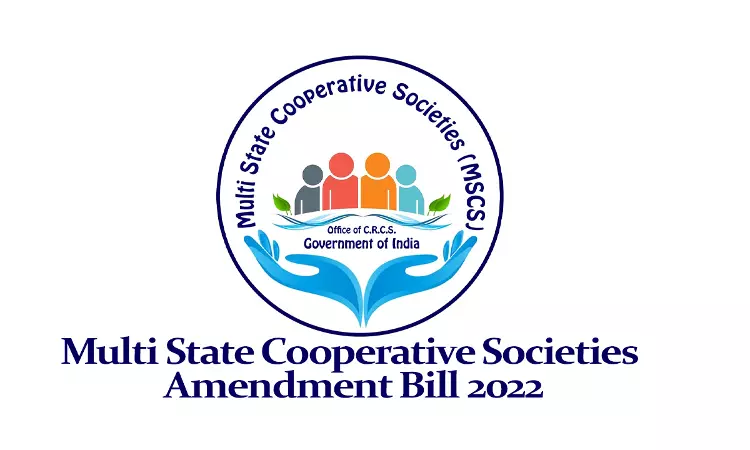Multistate Cooperative Societies Amendment Bill 2022 – A Bird’s Eye View
Sindhuja Rastogi
7 Aug 2023 5:09 PM IST

“Founded on the principles of private initiate, entrepreneurship and self-employment underpinned by the values of democracy, equality and solidarity the co-operative movement can help pave the way to a more just and inclusive economic order.” Kofi Annan
With the formation of the Union Ministry of Cooperation in July 2021 a separate administrative, legal and policy framework for strengthening and streamlining the co operative movement in the country was established. It proposed the Multi State Cooperative Societies (Amendment) Bill, 2022 last year and the same was ratified by Lok Sabha on the 25th of July.
Co-operatives are autonomous bodies which are voluntarily and democratically controlled by their members. Most of the policy and seminal decisions of the co-operatives are taken by its members. India is an agrarian nation, and it wouldn’t be wrong to say that it is a land of cooperatives because Indian economy has always been largely dependent on cooperatives. Even before formal co-operative societies were formed in India, there were instances of village communities collectively creating assets like village tanks and forests. After Independence, even the first five-year plan (1951-56), emphasised the adoption of co-operatives to cover various aspects of community development.
Multi-state co-operative societies as the name suggests, operate in more than one state in various sectors such as agriculture, textile, poultry, dairy, etc. Many important enterprises such as Amul, KRIBHCO, IFFCO are success stories that clearly establish that co-operatives cannot only provide largescale employment to lakhs of people but can also be industry leaders in their own domain.
The incorporation, regulation, and winding up of state co-operative societies is taken care of by the States while it is the Parliament which legislates on matters related to incorporation, regulation, and winding up of multi-state co-operatives. The Multi-State Co-operative Societies Act, 2002 provides for the formation and functioning of multi-state co-operatives. In 2011, the Constitution was amended and Part IXB was added to specify guidelines for running co-operative societies.
The 2022 Bill makes an attempt to amend the Act in accordance with the provisions of the provisions of Part IXB of the Constitution. The Bill even talks of establishing a Co-operative Rehabilitation, Reconstruction and Development Fund in order to revive the sick multi-state co-operative societies. A sick multi-state co-operative society is one that has: (i) accumulated losses equal to or exceeding its paid-up capital, free reserves, and surpluses, and (ii) suffered cash losses in the same and preceding financial years.
It is proposed that the multi-state co-operative societies which have made a profit in the preceding three financial years will contribute to the fund by making an annual deposit of one crore rupees or one percent of their net profit, whichever is less. The proceeds of this fund can then be utilised to revive sick multi-state co-operative societies. These sick co-operative societies may even be their business competitors. This is not only a bizarre proposition but could also cause frustration and dissatisfaction to the profit-making co-operatives.
The Bill is in a way penalizing the healthy co-operatives for being profitable and is making them pay for the shortcomings of their sick counterparts. It is important to note that as on December 15, 2022, 76 multi-state co-operative societies, including co-operative banks, were under liquidation. Hence, the financial burden that would be created on healthy cooperatives as a result of this move is unimaginable.
The Act specifically provides that based on the bye-laws of the society the shares held by certain government authorities in a multi-state co-operative society can be redeemed. In case the bye-laws are silent on the redemption of shares, a mutually agreed process between the society and the entity can be devised. The Bill amends this to provide that any shares held by the central and state governments cannot be redeemed without their prior approval. This goes totally against the co-operative ideals of autonomy and independence.
The Act provides that the central government can override the boards of sick multi-state co-operative societies, where it has a shareholding of at least 51%. However, the Bill proposes to empower the government to supersede the boards of any multi-state co-operative society where the government has any shareholding, or has extended any loan, financial assistance, or guarantee. The co-operatives are democratic, autonomous, and self-help organisations controlled by their members and this could clearly lead to the frustration of the very idea of co-operatives and make them mere puppets in the hands of the government.
The Report of the High-Powered Committee on Co-operatives (2009) had also explicitly recommended that government participation in the share capital of co-operatives should be minimal as it leads to government control, which violates the autonomy and hence, the very genesis of the co-operatives. The Committee recommended that even where the government has provided initial share capital in any multi-state co-operative society, it must be redeemed at the earliest.
Hence, the Autonomy of the cooperatives should be protected at all cost and they should not be made just another tool to further governmental idiosyncrasies and in order to ascertain this it must be ensured that there is minimal governmental control and involvement in the ownership and management of the multi-state cooperative societies.
The author is an Advocate and views are personal.


